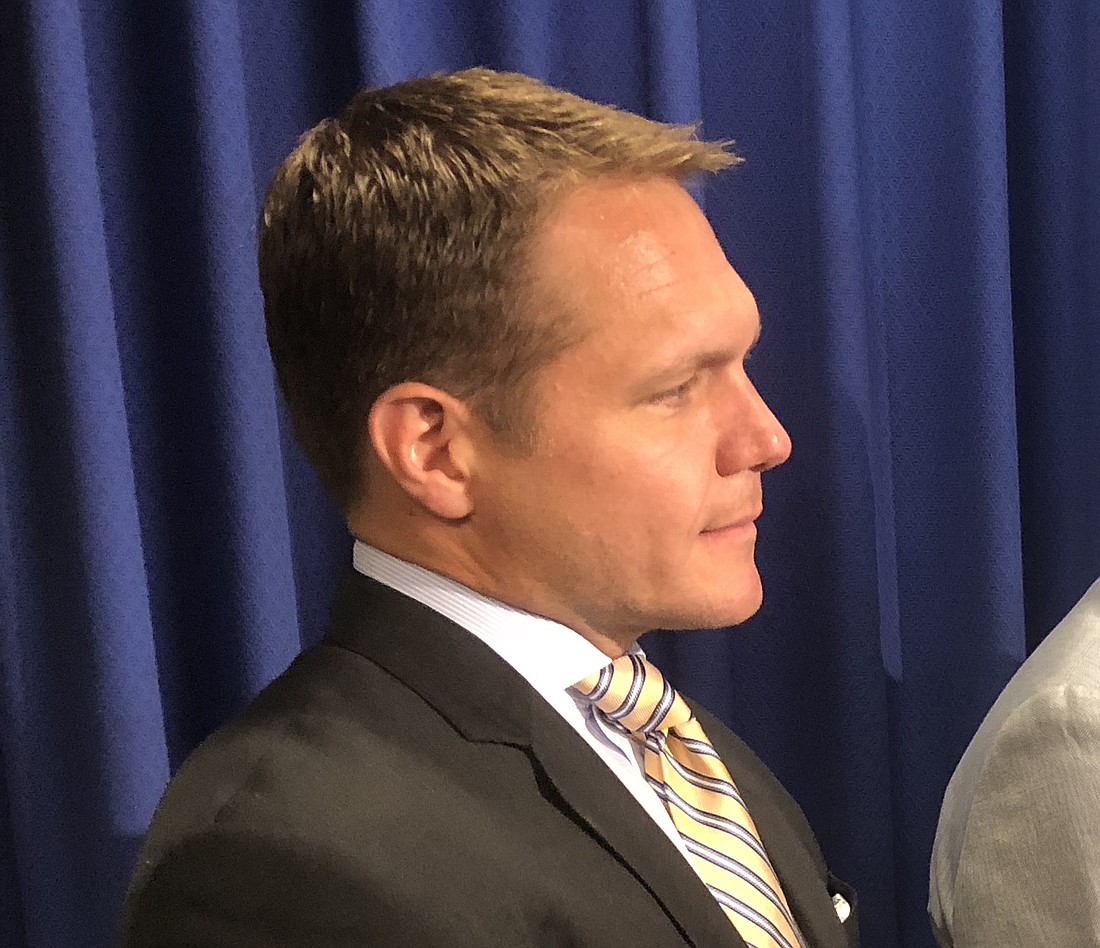
JEA interim CEO Aaron Zahn introduced a new executive leadership structure Thursday to City Council members and said the plan for the utility under his leadership will be about implementing “bold” strategies.
Zahn addressed the special council committee exploring the future of the public utility. The nation’s eighth-largest municipally owned provider of electricity, water and sewage services has been the subject of possible privatization talks since November.
Former Chief Financial Officer Melissa Dykes will assume the role of president and chief operating officer while Ryan Wannemacher was named interim chief financial officer.
Zahn said Dykes’ role will include overseeing the day-to-day operations while he focuses on a new strategic plan.
“What that does is maintain seamless operations, but also frees the CEO up to do all the work I’m talking about, which is no small lift,” Zahn said.
Dykes will be offered a contract for her new position, something Zahn said is being worked out. She makes more than $358,000 a year as CFO.
Zahn said her contract and other initiatives will be presented to the JEA board of directors at its May meeting.
Wannemacher served as JEA director of financial planning and analysis since April 2015.
Zahn said Wannemacher’s intimate knowledge of JEA’s financial aspects merit the promotion.
“He has been working with the rating agencies, and he’s effectively been overseeing the financial planning of the entire company for a number of years,” Zahn said.
Zahn said he was not comfortable naming a permanent CFO without consulting the board or doing so before a permanent CEO is found.
Zahn was installed as interim chief executive by the JEA board April 17.
He replaces Paul McElroy, who stepped down from the day-to-day operations April 6. McElroy’s contract will not be renewed when it expires Sept. 30.
Zahn said he has not been in contact with McElroy since taking the interim job.
He said when the utility returns to what he called a “normal business rhythm,” McElroy is expected to consult with JEA as it maps out a transition plan for a permanent CEO.
Zahn said the JEA board has issued a Request for Proposals to select an executive search firm that eventually will find the next chief executive.
'Bold' strategies
Zahn told council members the utility will focus on being “bold” during his tenure.
“We need to be bold, we need to be innovative, we need to be the utility of the future for Jacksonville,” Zahn said, although he didn’t elaborate on what he mean by “bold.”
Zahn told the special committee that the path forward includes focusing on the utility’s core businesses, listing and creating a “partnership framework,” aligning and formulating an updated strategic plan and executing that plan as a community.
He said details of a strategic plan would be presented to the JEA board in May.
Privatization talks simmer
Mayor Lenny Curry released a statement Thursday that he would not introduce plans to council concerning privatizing the public utility.
Curry previously said he had no opinion about selling the independent authority’s assets to a private operator, citing the need for more information.
Zahn said he had not read the statement as of Thursday afternoon.
“Either way, that has no impact on what we’re doing, because we’re back to business,” Zahn said.
A University of Florida evaluation of JEA commissioned by the Jessie Ball duPont Fund also will continue.
“The mayor’s statement does not affect the University of Florida evaluation of JEA,” said DuPont fund spokesperson Mary Kress Littlepage in an email.
“The study is underway and its findings will be valuable and informative to decision-makers and the public,” she said.
The Jacksonville Civic Council also has a committee looking at the privatization of JEA.
Council Vice President Aaron Bowman said Thursday that Curry’s statement sends a clear message that the city should not be focused “on the binary choice of sell or don’t sell.”
“The dialogue right now is not healthy,” Bowman said. “We have to let them get back to business and let the new leadership lay out a path forward.”
Bowman said the 19-member council should not be the panel discussing the future of JEA, “when the organization itself hasn’t had a chance to look at it.”
He said the exercise is wasting time and resources.
“I would hope that this is a strong signal that we can get back to business,” he said.